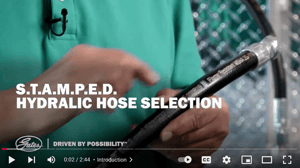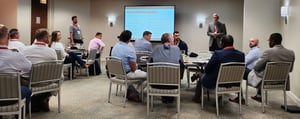
Fluid Power Curriculum
Learn more about adding the fluid power content to your curriculum that experts in the industry have identified as fluid power core competencies and general electrical/electronics, control systems, and data acquisition competencies that will propel the industry forward.
Prepare Your Students for a Job in Fluid Power
Whether you teach courses dedicated to fluid power or wish to incorporate fluid power into your mechanical engineering courses, you'll want to make sure your students are getting the skills they need to do well in their first jobs out of school. What's more, schools that teach these skills may be eligible to become a Power Partner university. Power Partner universities are eligible for NFPA funding, annual recognition and industry connection opportunities.
The fluid power industry has identified ten Fluid Power Core Competencies that they would like to see in newly graduated engineering students entering the fluid power industry:
- Understand fluid power benefits and limitations
- Conceptual and theoretical understanding of fluid power laws and principles (including energy transfer and power efficiency)
- Understand fluid power components and circuits
- Understand the impact of fluid properties, i.e., fluid viscosity, on fluid power system efficiency and performance.
- Understand machine level requirements and translate into fluid power system requirements
- Apply design, simulation and analysis tools to fluid power components and systems
- Appropriately size components in fluid power systems
- Integrate sensing and electronic control functions with fluid power components and systems
- Cite hands-on experience with fluid power components and systems
- Inspect, analyze and develop corrective action for product failure
Additional Competencies
Industry experts have identified additional competencies that many fluid power professionals need today. These competencies may be taught in university or technical college programs.
General Electrical/Electronics
- Understand how to read and create electrical schematics
- Understand types of electrical signals
- Analog and Digital
- Understand electrical components and how they interact
- Resistors, Capacitors, Inductors, Diodes, etc.
- Be able to troubleshoot issues by simulating failures and learn how to resolve it even without prior knowledge of system
- Be able to write test reports using appropriate language for the intended audience
- Understand where to find industry standards and why they are important to product design
Control Systems
- Understand how mechanical and electrical systems are integrated with fluid power and the benefit of integrating different technologies
- Possess a basic understanding of programming languages typically used in industry
- For example: C, Python, Java, Ladder Logic, Structured Text, FBD, SFC, proprietary software suites, etc.
- Possess the ability to develop code to solve a problem
- Understand how electronics are used to control fluid power systems
- Understand how power transforms or is delivered through a mechatronic system. (Concept of Multiphysics/multidisciplinary systems)
- Understand typical communication protocols used in industrial and mobile systems
- CAN, USB, Ethernet/IP, Modbus, DeviceNet, PROFINET, J1939, OPC, etc.
- CAN, USB, Ethernet/IP, Modbus, DeviceNet, PROFINET, J1939, OPC, etc.
Data Acquisition
- Understand what devices are intended to feed data into the system
- Understand how to collect data from sensors over the preferred communications protocols
- Understand how to compile data into meaningful information for the intended audience
- Understand different data storage mechanisms and their different benefits
- Understand how data is used to iterate designs to make systems safer, more efficient and more cost effective
- Understand best practices for data acquisition
University Curriculum
This activity focuses on the fabrication, testing and modeling of a simple pneumatic actuator.
Competencies Covered
4. Understand the impact of fluid properties, i.e. fluid viscosity, on fluid power system efficiency and performance.
8. Have hands-on experience with fluid power components and systems.
Faculty at Lawrence Tech incorporated fluid power based modules into the mechanical engineering curriculum, aiming to teach students the basic theories and concepts in the area of fluid power and expose them to real-world hydraulic and pneumatic applications.
Competencies Covered
1. Understand fluid power benefits and limitations.
2. Understand fluid power laws and principles (including energy transfer and power efficiency) conceptually and theoretically.
7. Can appropriately size components in fluid power systems.
8. Can integrate sensing and electronic control functions with fluid power components and systems.
9. Have hands-on experience with fluid power components and systems.
In this case study, a hydraulic system connected to a two-degree-of-freedom robot linkage is presented. The methods presented here can be applied to a variety of hydraulically operated machines with similar characteristics such as cranes, excavators and others which use valve-controlled hydraulic cylinders to actuate linkages.
Competencies Covered
2. Understand fluid power laws and principles (including energy transfer and power efficiency) conceptually and theoretically.
3. Understand fluid power components and circuits.
5. Understand machine level requirements and translate into fluid power system requirements.
6. Can apply design, simulation and analysis tools to fluid power components and systems.
7. Can appropriately size components in fluid power systems.
8. Can integrate sensing and electronic control functions with fluid power components and systems.
"Fluid Power System Dynamics" covers fluid power components and circuits. It was created for inclusion in the standard undergraduate system dynamics course that typically covers fluid systems but not fluid power. It can also be used as a self-study introduction to fluid power for working engineers who are new to fluid power. It has been used in courses at several of the CCEFP universities.
Competencies Covered
1. Understand fluid power benefits and limitations.
2. Understand fluid power laws and principles (including energy transfer and power efficiency) conceptually and theoretically.
3. Understand fluid power components and circuits.
4. Understand the impact of fluid properties, i.e. fluid viscosity, on fluid power system efficiency and performance.
5. Understand machine level requirements and translate into fluid power system requirements.
6. Can apply design, simulation and analysis tools to fluid power components and systems.
7. Can appropriately size components in fluid power systems.
8. Can integrate sensing and electronic control functions with fluid power components and systems.
9. Have hands-on experience with fluid power components and systems.
Using Simumatik3D, Ohio University simulated hydraulic components in the five basic demonstration hydraulic circuits.
Competencies Covered
3. Understand fluid power components and circuits.
6. Can apply design, simulation and analysis tools to fluid power components and systems.
9. Have hands-on experience with fluid power components and systems.
DOWNLOAD SIMULATION OVERVIEW | DOWNLOAD SUPPLEMENTAL DIAGRAM
These materials were used to further advance uses of fluid power in the MIT course “2.007 – Design and Manufacturing” and provided substantial new material related to fluids, thermodynamics, pneumatics, and related sensing and control in both lecture and lab sessions.
Competencies Covered
1. Understand fluid power benefits and limitations.
2. Understand fluid power laws and principles (including energy transfer and power efficiency) conceptually and theoretically.
4. Understand the impact of fluid properties, i.e., fluid viscosity, on fluid power system efficiency and performance.
5. Understand machine level requirements and translate into fluid power system requirements.
7. Can appropriately size components in fluid power systems.
8. Can integrate sensing and electronic control functions with fluid power components and systems.
9. Have hands-on experience with fluid power components and systems.
DOWNLOAD MIT DESIGN & MANUFACTURING REPORT | DOWNLOAD DESIGN & MANUFACTURING LECTURE | DOWNLOAD DESIGN & MANUFACTURING EXAM
Syllabus for course covering basic fluid power concepts, standard hydraulic symbols, component design and
applications, fluid power system considerations, design and operation.
Competencies Covered
1. Understand fluid power benefits and limitations.
3. Understand fluid power components and circuits.
5. Understand machine level requirements and translate into fluid power system requirements.
6. Can apply design, simulation and analysis tools to fluid power components and systems.
7. Can appropriately size components in fluid power systems.
9. Have hands-on experience with fluid power components and systems.
10. Can inspect, analyze and develop corrective action for product failure.
he NFPA Fluid Power Vehicle Challenge strives to promote original thinking in a competitive setting by combining two technology platforms that are not normally associated with one another—human-powered vehicles and fluid power (hydraulics and pneumatics). The Vehicle Challenge easily embeds into capstone design courses most mechanical engineering students take in their senior year and includes exclusive opportunities to connect with industry professionals.
Competencies Covered
- Understanding of fluid power benefits and limitations.
- Understanding of fluid power laws and principles (including energy transfer and power efficiency) conceptually and theoretically.
- Understanding of fluid power components and circuits.
- Understand the impact of fluid properties, i.e., fluid viscosity, on fluid power system efficiency and performance.
- Understanding of machine level requirements and translate into fluid power system requirements.
- Ability to apply design, simulation and analysis tools to fluid power components and systems.
- Ability to appropriately size components in fluid power systems.
- Ability to integrate sensing and electronic control functions with fluid power components and systems.
- Hands-on experience with fluid power components and systems.
- Ability to inspect, analyze and develop corrective action for product failure.
LEARN MORE ABOUT THE VEHICLE CHALLENGE
In this course, you will be introduced to the fundamental principles and analytical modeling of fluid power components, circuits, and systems. You will learn the benefits and limitations of fluid power compared with other power transmission technologies; the operation, use, and symbols of common hydraulic components; how to formulate and analyze models of hydraulic components and circuits; and how to design and predict the performance of fluid power circuits. This course is supported by the National Science Foundation Engineering Research Center for Compact and Efficient Fluid Power, and is endorsed by the National Fluid Power Association.
Competencies Covered
1. Understand fluid power benefits and limitations.
2. Understand fluid power laws and principles (including energy transfer and power efficiency) conceptually and theoretically.
3. Understand fluid power components and circuits.
4. Understand the impact of fluid properties, i.e., fluid viscosity, on fluid power system efficiency and performance.
5. Understand machine level requirements and translate into fluid power system requirements.
6. Can apply design, simulation and analysis tools to fluid power components and systems.
7. Can appropriately size components in fluid power systems.
8. Can integrate sensing and electronic control functions with fluid power components and systems.
9. Have hands-on experience with fluid power components and systems.
10. Can inspect, analyze and develop corrective action for product failure.
This activity focuses on improving the performance of an air engine composed of a single pneumatic cylinder attached to a flywheel.
Competencies Covered
2. Understand fluid power laws and principles (including energy transfer and power efficiency) conceptually and theoretically.
3. Understand fluid power components and circuits.
4. Understand the impact of fluid properties, i.e. fluid viscosity, on fluid power system efficiency and performance.
8. Have hands-on experience with fluid power components and systems.
These presentations focus on Electrohydraulic System Controls.
Competencies Covered
- Integrate sensing and electronic control functions with fluid power components and systems
- Cite hands-on experience with fluid power components and systems
Download EH Valves in Electrohydraulic Systems Lecture
Download Open Loop EH Control System Lecture
Download PAC Network for EH Sequence Position Control Lecture
Competencies Covered
1.Integrate sensing and electronic control functions with fluid power components and systems
2. Cite hands-on experience with fluid power components and systems
3. Understand fluid power components and circuits
5. Understand machine level requirements and translate into fluid power system requirements
6. Apply design, simulation and analysis tools to fluid power components and systems
7. Appropriately size components in fluid power systems
8. Integrate sensing and electronic control functions with fluid power components and systems
9. Cite hands-on experience with fluid power components and systems
10. Inspect, analyze and develop corrective action for product failure
Competencies Covered:
2. Conceptual and theoretical understanding of fluid power laws and principles (including energy transfer and power efficiency)
3. Understand fluid power components and circuits
6. Apply design, simulation and analysis tools to fluid power components and systems
8. Integrate sensing and electronic control functions with fluid power components and systems
Simulated Hydraulic Motor Control Exercises
Simulated Hydraulic Motor Control Lab Procedure Document
Simulation-Based Experiments in Hydraulic Motor Speed Control
Enhance Your Existing Courses
1. Understand fluid power benefits and limitations.
3. Understand fluid power components and circuits.
5. Can apply design, simulation and analysis tools to fluid power components and systems.
6. Can appropriately size components in fluid power systems.
1. Understand fluid power benefits and limitations.
2. Conceptual and theoretical understanding of fluid power laws and principles.
6. Can appropriately size components in fluid power systems.
8. Hands-on experience with fluid power components and systems. (Lab experience)
1. Understand fluid power benefits and limitations.
3. Understand fluid power components and circuits.
4. Understand machine level requirements and translate into fluid power system requirements.
6. Can appropriately size components in fluid power systems.
8. Hands-on experience with fluid power components and systems (Lab experience)
9. Can inspect, analyze and develop corrective action for product failure.
1. Understand fluid power benefits and limitations.
4. Understand machine level requirements and translate into fluid power system requirements.
5. Can apply design, simulation and analysis tools to fluid power components and systems.
7. Can integrate sensing and electronic control functions with fluid power components and systems.
2. Conceptual and theoretical understanding of fluid power laws and principles.
7. Can integrate sensing and electronic control functions with fluid power components and systems.
4. Understand machine level requirements and translate into fluid power system requirements.
5. Can apply design, simulation and analysis tools to fluid power components and systems.
6. Can appropriately size components in fluid power systems.
8. Hands-on experience with fluid power components and systems
9. Can inspect, analyze and develop corrective action for product failure.
Supplement Curriculum with Videos
To help educators across the country access more virtual fluid power content to use in the classroom, we are now sharing videos of real-life examples of various fluid power technologies from NFPA member companies and fellow educator partners.
These videos are free to use for educational purposes. This is a great opportunity for students to learn about the realm of fluid power technologies and the different career path opportunities. This can also help students become familiar with how specific products work while also starting to learn about the individual companies in the industry so that they are more educated about where to look for internships/jobs, and even when making purchasing decisions once they’re in the workforce. If you have an educational video that you feel would be beneficial to students learning about fluid power, please send them to the Workforce Team at workforce@nfpa.com for consideration.

Description of hose construction and manufacturing
.png?width=300&name=Screenshot%20(309).png)
Accumulators charging
.png?width=300&name=Screenshot%20(310).png)
Installation video
.png?width=300&name=Screenshot%20(312).png)
Video of recent automation projects
.png?width=300&name=Screenshot%20(314).png)
How to program Allen Bradley ControlLogix 5000 PLCs. How to establish an ethernet, ethernet IP, and virtual communication using RSLinx.
.png?width=300&name=Screenshot%20(315).png)
How to create a very simple HMI Video and demonstrate how to connect the HMI program to a PLC.
.png?width=300&name=Screenshot%20(316).png)
Program designed to seal in a motor when the start button is pressed. The motor will remain running even when the operator is not pressing the start button. The start button is normally open. The normally closed Estop, the normally open over-speed switch, and the normally closed Line Estop will all stop the motor.
Teacher Support Materials
This curriculum dives in deep and can include a Fluid Power Action Challenge competition within your class at the end of the session.
TeachEngineering.com offers standards-aligned, hands-on lesson to teach science and engineering.
Learn about fluid power basics, pressure and flow, hydraulic schematic symbols, and much more.
The Fluid Power Action Challenge aligns with science curricula used in many states.
The Fluid Power Action Challenge is a STEM-based competition that challenges middle or high school students to solve an engineering problem using fluid power.
Link to: FLUID POWER ACTION CHALLENGE
Link to: $500 ACTION CHALLENGE GRANT APPLICATION
Fluid Power Action Challenge kits, challenge boards, and related materials can be purchased through the Mechanical Kits website linked here. The vendor, Work Services Corporation (WSC), can be reached via its customer service. email: support@mechanical-kits.com

